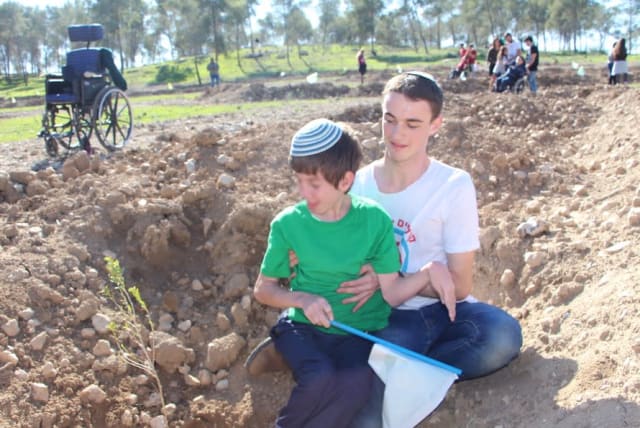The disabled need more help during the High Holy Days - opinion

Please don’t assume that people with disabilities will want to just stay at home because of the difficulties this year.
It is, of course, the height of understatement to point out that the upcoming Rosh Hashanah and Yom Kippur will be wholly different this year. Defined by a pandemic and how it has impacted on all of our lives in so many different ways, these days will require of us to reassess much of what they are truly about and how they are commemorated.
It is therefore critical that we recognize how our current reality will impact on a community that is all too often overlooked – the disabled.
While there is a traditional understanding of who we view as members of this community, this year that definition deserves to be expanded considerably. Essentially, anyone who is at high risk to contract the virus is dealing with a form of handicap and therefore needs to be treated with the same concern and accommodation.
Likely the most relevant change that will impact upon those with physical disabilities is how many prayer services will be taking place in settings that were not necessarily designed to be accessible. Parks, parking lots, courtyards, backyard gardens and countless other spots will become impromptu prayer halls. While the world has made remarkable strides in making our public spaces accessible to the blind, people in wheelchairs, the deaf and for other disabilities, the reality is that much of those efforts will be irrelevant on these High Holy Days.
It is therefore incumbent upon each and every community leader, rabbi and those who will be organizing services to address this challenge.
Please don’t assume that people with disabilities will want to just stay at home because of the difficulties this year. They have the same desire to come out and pray, and are sure to view these new arrangements as yet another obstacle imposed by corona.
Take a moment and ask if there is anyone in your surroundings who will be unable to come and pray because of the outdoor or improvised setting. Wherever possible, be sure to provide accessibility options for wheelchairs or even move your intended prayer space somewhere closer to where the impacted person can more easily attend.
Many of these services will take place in outdoor areas which can also be a problem for both the disabled and the elderly. Be sure to take notice of the weather conditions, particularly the heat. The spaces should be covered with shade, and ample water should be available.
Those leading the services should be careful not to get caught up in their own prayers, and be aware of what is going on around them. This is not the year for extended renditions of tunes or songs. Where there is a doubt over whether a particular prayer needs to be said, the trend should be to opt on the side of caution and cut that prayer from the service. The goal should be to make the service as meaningful as possible, but also far shorter than in years past. Thought should also be given to the time of day when the prayers are set, to avoid the hottest hours.
While the words of prayer, the tunes and the setting that define Rosh Hashanah and Yom Kippur are certainly a central aspect of how we traditionally observe these days, it is far more important that we place compassion at the forefront. Corona has changed so many aspects of our lives, and this is certainly no exception.
Even with all the measures for accessibility that we might put into place, let us not forget that there will be those who will not be able to come out and pray in a public setting. Either because they are ill with corona or cannot risk infection, more people than ever will be spending these days in solitude.
If you know of neighbors who are in such a situation, be sure to reach out to them and remind them that the holiday is one of compassion and friendship even when we cannot all be together. Particularly for Rosh Hashanah, plans should be put in place that someone will arrive outside the homes of those in isolation and blow the shofar.
There is no doubt that this current reality is deeply challenging and often painful. But it also inspires a reevaluation of what it means to care for and think of others. In that sense, we are blessed to be given a lesson – albeit a difficult one – in what is ethical behavior. By embracing these modes of kindness and caring, we can hope that in the coming year we, our families and indeed the entire world will be blessed with happiness, prosperity and most importantly good health.
The writer is the director of the Tzohar Center for Jewish Ethics and a founder of the Tzohar Rabbinical Organization.
Jerusalem Post Store
`; document.getElementById("linkPremium").innerHTML = cont; var divWithLink = document.getElementById("premium-link"); if (divWithLink !== null && divWithLink !== 'undefined') { divWithLink.style.border = "solid 1px #cb0f3e"; divWithLink.style.textAlign = "center"; divWithLink.style.marginBottom = "15px"; divWithLink.style.marginTop = "15px"; divWithLink.style.width = "100%"; divWithLink.style.backgroundColor = "#122952"; divWithLink.style.color = "#ffffff"; divWithLink.style.lineHeight = "1.5"; } } (function (v, i) { });
